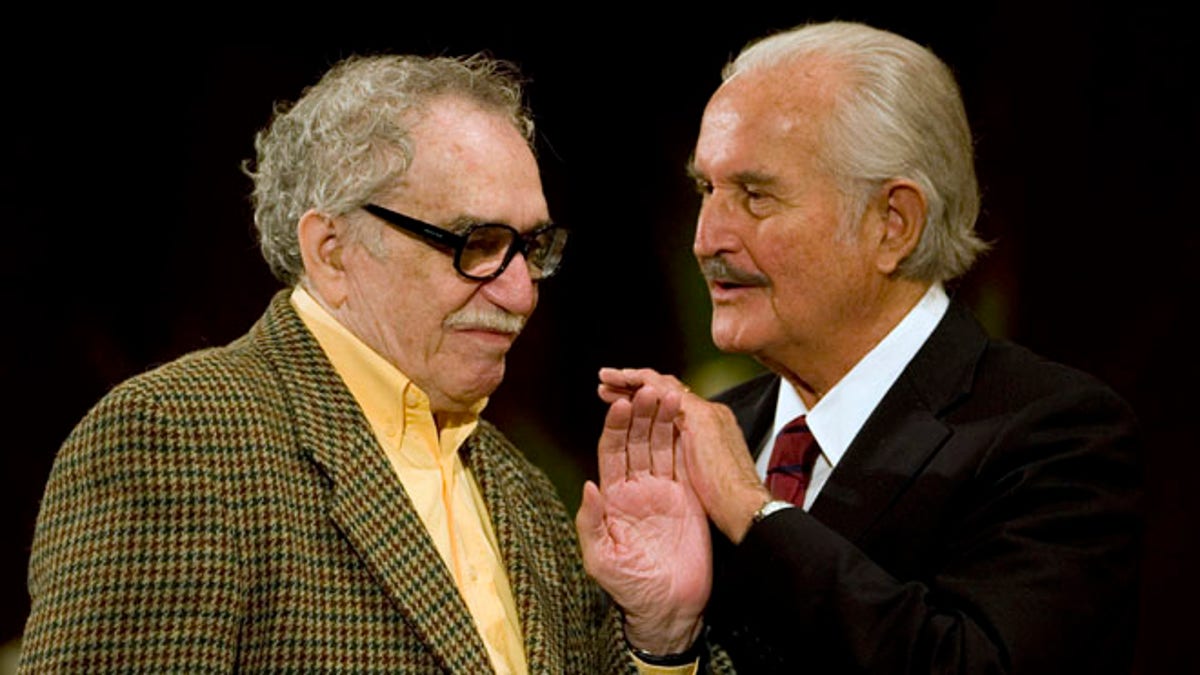
Mexican writer Carlos Fuentes, right, talks to Colombian author Gabriel Garcia Marquez. (AP Photo/Dario Lopez-Mills) (ap)
Renowned Mexican author and diplomat Carlos Fuentes died at the age of 83 in a Mexico City hospital, according to local news reports.
The news of the novelist’s passing on Tuesday was confirmed by President Felipe Calderón via Twitter.
“I profoundly lament the passing of our beloved and admired Carlos Fuentes, writer and universal Mexican,” the Mexican president tweeted. “May he rest in peace.”
“Carlos Fuentes was a colossus,” said Guatemalan novelist David Unger, who attended a series of the late author’s lectures at Columbia University in the 1980s. “Though elegant and epicurean by nature, he championed the immigrant, the downtrodden, the voiceless with passion and decency.”
The prolific Fuentes wrote his first novel, "Where the Air is Clear," at age 29, laying the foundation for the flourishing of Latin American literature during the 1960s and 1970s that became known as the "Boom." He wrote to the end, publishing an essay on the change of power in France in the newspaper Reforma the same day he died.
The son of a career diplomat, Fuentes lived an international life. He was born in Panama city on Dec. 11, 1928 to Mexican parents and spent most of his early life abroad, growing up in Montevideo, Rio de Janeiro, Washington, D.C., Chile, and Buenos Aires. He later divided his time between homes in Mexico City home and London, where he did most of his writing.
Before joining the ranks of the greatest authors of Latin America’s “Boom” generation, Fuentes studied law at the University of Mexico. As a student, he began the lifelong interest in politics that tinged his literary work, joining the Communist Party in the 1950s.
Fuentes resigned from the Party in 1962, but continued to lean left politically, viewing the Cuban Revolution with admiration.
Major Works by Carlos Fuentes
- The Good Conscience, 1961
- Aura, 1961
- The Death of Artemio Cruz, 1962
- Terra Nostra, 1975
- The Hydra Head, 1978
- The Old Gringo, 1985
- The Campaign, 1992
- The Orange Tree, 1994
- The Years with Laura Díaz, 1999
- Destiny and Desire, 2008
Though the United States once denied his entry to the country under the McCarren-Walter Act for his outspoken views, the erudite writer also admired America and taught classes at Harvard, Princeton, Columbia and Brown universities through his life.
The Mexican Revolution—a bloody upheaval that shook Mexico from 1910 to 1920 and paved the way for the Institutional Revolutionary Party, or PRI, to take power for seven decades—played a prominent role in some of his most important works, including “The Death of Artemio Cruz.” The work blasted the PRI for failing to realize the Revolution’s lofty, populist goals.
“The Old Gringo,” the novel many American readers know him for, tells the story of San Francisco journalist Ambrose Bierce, who disappeared during the Mexican Revolution. The book was later made into a film starring Gregory Peck and Jane Fonda.
While Fuentes criticized Mexico’s one-party state, he also worked within it, serving as Ambassador to England. He resigned from the foreign service, however, when the Mexican government massacred an unknown number of students protesters in the Tlatelolco section of Mexico City in 1968. (The episode was the subject of the book “The Night of Tlatelolco” by Fuentes’ contemporary Elena Poniatowski.)
Fuentes rejoined the foreign service in 1975, accepting a post as ambassador to Paris.
In later life, Fuentes moderated his views on Latin America’s political left somewhat, blasting Venezuelan President Hugo Chávez as a “tropical Mussolini.” On the other side of the spectrum, Fuentes leveled criticism against the U.S. war on terror and its policies against illegal immigration.
Fuentes was married from 1959 to 1973 to actress Rita Macedo, with whom he had his only surviving daughter.
After the couple divorced, Fuentes married journalist Silvia Lemus and they had two children together. Their son Carlos Fuentes Lemus died from complications associated with hemophilia in 1999, and Natasha Fuentes Lemus died in 2005 after a cardiac arrest.
One of Latin America’s foremost writers, Fuentes had often been mentioned as a contender for the Nobel Prize for literature, though he never won the award. He won the Cervantes Award in 1987, one of Spain’s highest literary honors.
The news of Fuentes death saddened Chicano novelist Sergio Troncoso, author of “From This Wicked Patch of Dust.”
“His work had meaning to me,” Tronoso said. “It’s a deep loss, any time you lose one of these Latin American masters. These are people who represent our heritage.”
Troncoso recalled that Fuentes gave the commencement speech when he graduated from Harvard University in 1983. The Mexican author exhorted the students to cultivate their imaginations and avoid neglecting the life of the mind as they entered the workforce.
The young Troncoso took his advice, traveling to Mexico City on a Fulbright grant the next year, where he poured over Fuentes’ work. Troncoso still owns the copy of “The Death of Artemio Cruz” he bought at the Librería Gandhi, the famed Mexico City bookstore in the neighborhood of Coyacán.
“His words were very important to me,” Troncoso said. “Something to look up to and try to emulate.”
Contains material from the Associated Press.
Follow us on twitter.com/foxnewslatino
Like us at facebook.com/foxnewslatino








































